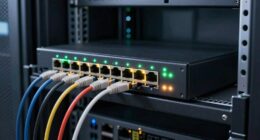Decentralized Identity (DID) puts you in control of your online persona by allowing you to manage and verify your credentials securely without relying on third-party authorities. You can own your data, share only what’s necessary, and prevent unwanted access. Your identity info is stored across a decentralized network, enhancing privacy and reducing risks like theft. If you want to understand how DID empowers your digital sovereignty and what benefits it offers, there’s more to discover.
Key Takeaways
- DID enables users to independently control and manage their digital identity without relying on centralized authorities.
- It uses cryptography and blockchain to securely store and verify credentials, enhancing privacy and security.
- Users can selectively disclose personal information, maintaining privacy and reducing unnecessary data sharing.
- DID facilitates seamless, interoperable identity verification across multiple platforms and services.
- It promotes digital sovereignty, giving users full ownership and control over their online persona and data.

Have you ever wondered how you can securely prove your identity online without relying on central authorities? With traditional systems, your personal data is stored on servers controlled by companies or governments, leaving you vulnerable to breaches and misuse. Decentralized Identity, or DID, offers a fresh approach, empowering you to own and control your digital identity completely. Instead of depending on third parties, you maintain your credentials in a digital wallet that you control, giving you a higher degree of digital sovereignty. This means you decide what information to share, with whom, and when, markedly enhancing your privacy.
Decentralized Identity empowers you to control your digital data and verify your identity securely without relying on central authorities.
In a DID system, your identity isn’t stored in a single, centralized database that hackers can target. Instead, it’s distributed across a network of blockchain or similar decentralized infrastructure. When you need to verify your identity, you generate cryptographic proofs that confirm your credentials without exposing unnecessary personal details. This process not only reduces the risk of identity theft but also improves your privacy by limiting data exposure. You’re no longer required to share entire datasets or personal information unnecessarily; instead, you can selectively disclose only the facts relevant to the transaction or service.
Digital sovereignty plays a critical role in this ecosystem. You regain control over your online persona, free from the influence or oversight of large corporations or governments. You’re the master of your data, deciding how and where it’s used. This shift enhances privacy by minimizing the digital footprint you leave behind. No longer do third parties hold your sensitive information in their servers, where it could be compromised or misused. Instead, your credentials are cryptographically secured and stored locally or in a trusted digital wallet, giving you confidence that your identity is protected from unauthorized access.
Furthermore, DID facilitates seamless identity verification across multiple platforms without the need for repetitive login processes or centralized logins. This interoperability simplifies your online experience while maintaining strict privacy standards. You can prove your age, qualifications, or memberships without revealing more than necessary, preserving your privacy enhancement. This approach not only streamlines interactions but also aligns with the increasing demand for data protection and user autonomy in the digital age.
In short, decentralized identity puts you in the driver’s seat of your online persona. It offers a way to prove who you are securely, privately, and with full control over your data. By embracing DID, you can enjoy a safer, more private digital experience—one where your privacy is respected, and your digital sovereignty is restored.
Frequently Asked Questions
How Secure Is Decentralized Identity Compared to Traditional Credentials?
You might wonder how secure decentralized identity is compared to traditional credentials. It generally offers higher cryptographic security because it uses data encryption and cryptographic techniques to protect your information. With decentralized systems, your data isn’t stored in a central server, reducing risks of hacking. This approach gives you more control and safety, making your online identity more resilient against breaches and unauthorized access.
Can DID Be Integrated With Existing Online Platforms Easily?
You might wonder if integrating DID with existing online platforms is straightforward. Generally, it depends on platform compatibility and how flexible the platform’s architecture is. Many providers are working on streamlined user onboarding processes, making it easier to adopt DID technology. While some integration challenges exist, with proper support and updates, you can expect smoother implementation, enabling you to take control of your online identity seamlessly.
What Are the Costs Associated With Implementing DID Solutions?
You’re wondering about the costs involved in implementing DID solutions. A thorough cost analysis helps you understand expenses like infrastructure, development, and maintenance. Keep in mind that implementation challenges, such as integrating with existing systems and ensuring security, may add to these costs. While initial investment can be significant, long-term benefits like enhanced privacy and control often justify the costs, making DID a worthwhile consideration.
How Do Privacy Laws Impact Decentralized Identity Deployment?
Privacy regulations critically influence how you deploy decentralized identity solutions. You must guarantee your system meets legal compliance by adhering to privacy laws like GDPR or CCPA, which govern data handling and user consent. These laws protect user rights and impact your design choices, requiring robust security measures and transparent policies. Failing to comply can lead to penalties, so understanding privacy regulations is essential for seamless, lawful decentralized identity deployment.
Who Owns and Controls the Data in a DID System?
In a DID system, you own and manage your data through user control and data ownership. Unlike centralized systems, you oversee your credentials and personal information, deciding what to share and with whom. This means you’re in charge of your digital identity, maintaining privacy and security. Your control ensures that your data isn’t owned or controlled by third parties, giving you greater autonomy over your online persona.
Conclusion
With decentralized identity, you take control of your online persona, ensuring your data stays private and secure. You no longer have to rely on centralized platforms to verify who you are. Instead, you own your digital identity, sharing only what you choose. This empowers you to navigate the internet confidently, knowing your information is in your hands. Embrace DID and step into a future where you truly own your online presence.









